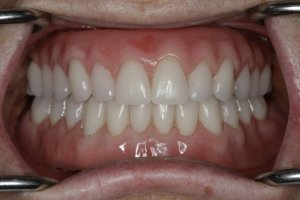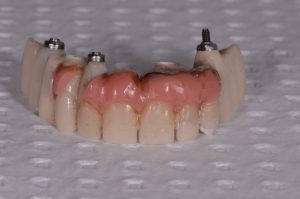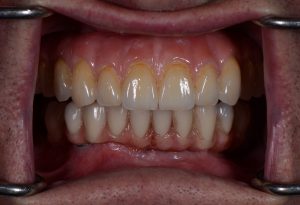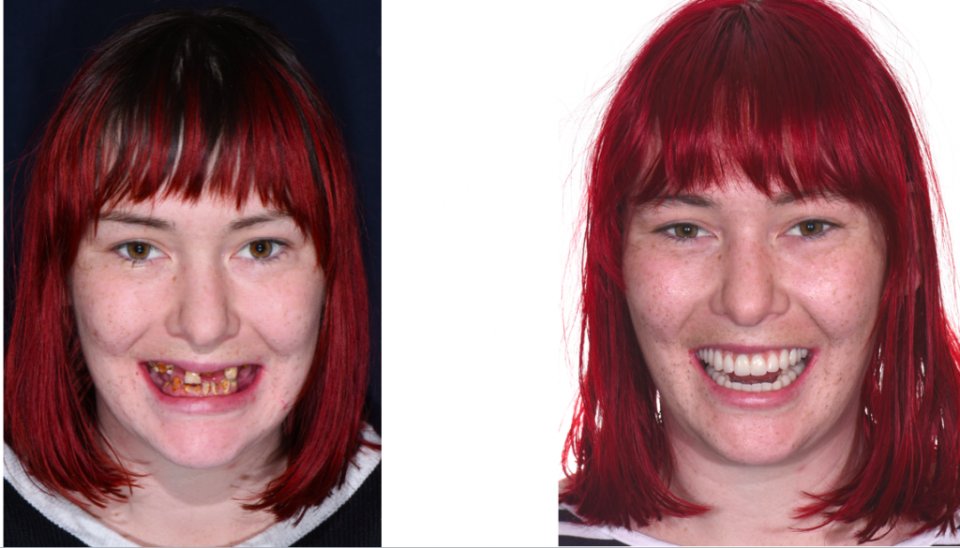All on 4 Cost: The Need-to-Know
The cost of an All-On-4 dental implant treatment varies significantly from $17,000 to over $30,000 which is cause for confusion among many patients who visit us for a consultation.
Financials are important. As a patient, it’s perfectly understandable to expect that All on four pricing should be the same wherever you go—the treatment is the same, after all: four dental implants to hold a full set of fixed teeth, or tooth bridge.
So why the huge differences in price? And, given the disparity in advertised cost, how do you go about making a fair All on Four price comparison?
The first thing we explain to patients is that the treatment has two parts. First, there’s the dental implant placement, where four implants are placed in the jaw - this is where the treatment gets its name.
The second and equally important part is the tooth bridge placed on the implants. As a patient, arguably the most important part as this is what gives you your smile back and restores function. It is this second part that most impacts the price of all on 4.
There are several methods to make the teeth that are attached to your dental implants. There are also many different materials.
The lower price point - $20K or under typically includes a provisional tooth bridge that’ll need replacing to a more robust option within a year, maximum two. This is what we refer to as the initial teeth, the ones you get in the few days following implant placement.
On the other hand, the more expensive options - $25K+ or more includes the cost of your definitive tooth bridge as well. This bridge is built to last longer, be more aesthetic and perfectly customised to you.
It pays to clarify this point with your dental practitioner to ensure that there are no surprises down the track.
But there are other factors that will determine how a clinic prices their all on 4 treatment and it’s important for you to ask the right questions to ascertain the level of treatment you’ll receive.
Lower All on 4 pricing may mean compromising on the quality of the clinic, dentist and materials—not to mention the end result.
Opting for a lower all on four cost could mean:
- Cheap dental implants from less reputable manufacturers
- Exposure to risk caused by inexperience
- A new smile that is not as natural or aesthetically pleasing
- Extra charges for items that should really be included as part of your treatment plan
The true cost of full mouth dental implants in Australia is determined by a range of factors, which I’ll go over in this guide.
Remember—an All on Four isn’t a cookie-cutter procedure, but a customised and complex dental treatment. Any complex dental treatment should always be performed by a highly trained, skilled and experienced dental surgeon. Your All on 4 treatment isn’t just a procedure, it’s an investment: in your health, wellbeing, and future.
All on Four cost: Variables at a Glance
So that you can truly assess whether you’re comparing apples with apples, I’ll dig deeper into each All on four cost variable in the next section including:
- 1. All on 4 cost variable #1
Type and quality of your tooth bridge - 2. All on four cost variable #2
Training and expertise of your dentist - 3. All on four cost variable #3
Skill and experience in aesthetic smile design - 4. All on 4 cost variable #4
Type and quality of your dental implants - 5. All on four cost variable #5
Inclusions in your treatment plan
All on 4 treatment stages, explained
Every aspect of All on Four treatment requires a high level of skill and training, and your dentist should invest a significant amount of their time into the planning and execution of each phase:
1. Consultation, diagnosis and treatment planning
Your All on 4 dentist meets with you for a comprehensive check of your teeth, bite, medical history and assess your All on Four suitability. After reviewing the clinical notes and the 3D scan of your jaw, your personal treatment plan is presented.
2. Dental Implant placement
This is the surgical part of your treatment, where your dentist will place the titanium tooth rods that will support your new tooth bridge. Timewise, this takes approx. 2.5hrs per jaw, plus 2-3 hours recovery. Typically just four dental implants are placed but if you have soft bone you may need six. At this stage, we also do a try-in of the proposed teeth with a 3D printed model to check your bite, tooth position before finalising them.
3. Tooth bridge placement
On the 3rd or 4th day after your implants are placed your new teeth are ready to be connected to your implants. This tooth bridge is made from high-performance acrylic. It can take 3-6 months for your jaw bone to fuse around the dental implants and your soft gum tissue to heal. If you had grafting (bone added to your jaw) this process may extend to 12 months. While this first tooth bridge may well last beyond 12 months we always highly recommend upgrading as soon as possible to a stronger, more biocompatible definitive bridge. Typically one with a custom milled titanium frame with either Zirconia or acrylic teeth. Chapter 2 of this article covers these options in greater detail.
4. Final Tooth bridge placement
Once you have reached your optimal healing period it is time to take new impressions and photos in order to craft your final tooth bridge. Most patients can expect this step to occur at around the 6-month mark after implant placement. But of course, each patient's needs are individually assessed.
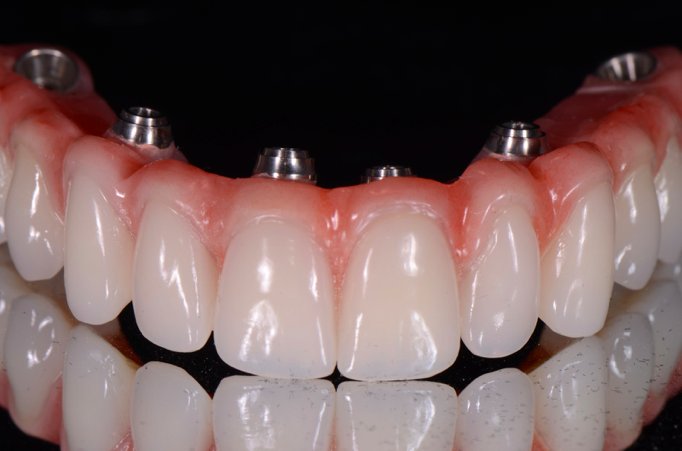
All on 4 Cost Variable 1: Type and Quality of Tooth Bridge
A tooth bridge is a single piece that joins up to 12 teeth for strength and stability. Metal holes in the tooth bridge enable attachment to the titanium tooth rods with special screws. Typically higher all on 4 price points correlate to the type of final teeth you choose.
All on 4 dental implant tooth bridges can be made from different materials and the cost of the teeth is determined by the choice of material.
The two most important factors to consider are durability and aesthetics. The costlier tooth bridges are more complex to make but are made from more durable materials and have higher levels of aesthetic customisation.
The Four Most Common Types of All on Four Tooth Bridge
| Starter | All on 4 - High-strength acrylic bridge
A fast, temporary solution lasting 12-months+, the Starter offers high-quality acrylic teeth with natural-appearance. Easy upgrade to Classic or Signature when you're ready.
|
From $18,000 |
| Classic | All on 4 - Titanium and acrylic bridge
Our go-to introductory model for more than 15 years, the Classic offers a milled titanium bar with natural-appearance acrylic teeth chosen to suit your face, age & personality.
|
From $27,000 |
| Signature | All on 4 - Titanium and zirconia bridge
The ultimate in aesthetics and strength, using the latest in digital technology, the signature offers superior strength and longevity & zirconia is significantly more aesthetic than acrylic.
|
From $34,000 |
| Statement | All on 4 - Titanium and ceramic bridge
Made to the most exacting standard. The Statement boasts individually handcrafted, custom-designed teeth to the highest standard. You won't achieve a more lifelike result.
|
From $50,000 |
1. Acrylic tooth bridges
There are different types of acrylic bridges and many ways to make them so this can get confusing. Different implant dentists have different methods they use so it’s important to ask which option your dentist prefers.
Often a denture is modified (or existing one used if you have one) to be attached to the implants. Only recommended for a short period of time as it is not strong enough to when you end your soft food diet and the teeth will break and fracture. This bridge can also feel quite bulky in the mouth and be harder to clean as it is not as customised and streamlined as it should be.
At Macquarie Street Centre, our acrylic option is the Starter tooth bridge. Recent technological advancements in 3D scanning and milling means we can use a single piece of high-performance acrylic milled to your ideal tooth shape. It's aesthetic and less bulky than a modified denture and a significant advancement in dental technology.
2. Milled titanium foundation with Acrylic teeth
A metal foundation underneath the acrylic teeth provides strength and durability but also makes for a lean tooth bridge, as less acrylic is required. High-quality acrylic materials can look very natural, however, acrylic teeth will wear and tear over time—even when made to the most exacting standards.
At Macquarie Street Centre, our metal-reinforced acrylic option is the Classic tooth bridge.
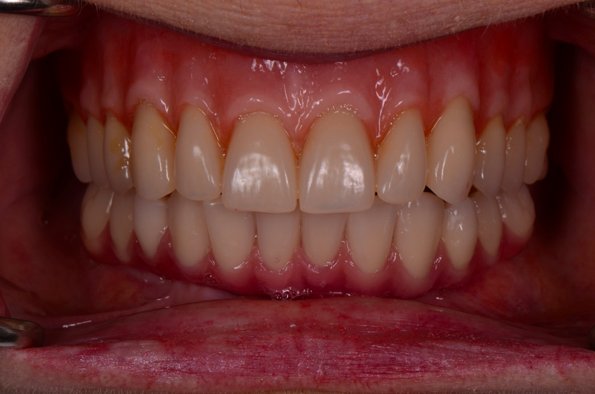
3. Milled titanium foundation with Zirconia teeth
The strongest and most aesthetic materials currently available in dentistry for tooth replacement. Zirconia is a naturally-occurring white material with a similar strength to metal. We can customise the front surface of the zirconia by layering porcelain to mimic the translucency of natural teeth.
Unlike acrylic teeth that will likely need replacing every 5 years or so Zirconia teeth will not wear, tear or stain so while a bigger investment upfront it will pay for itself in the long run. Patients with a history of bruxism (tooth grinding) are recommended this option due to its strength.
At Macquarie Street Centre, our zirconia and titanium option is the Signature tooth bridge.
4. Titanium and zirconia tooth bridge with individual porcelain teeth
Macquarie Street Centre is one of the few clinics in Australia to offer this tooth bridge option— our Statement tooth bridge. Giving you the strength of titanium and zirconia, and the highest standard of Smile Design, each tooth is individually handcrafted and layered in porcelain for unbeatable lifelike results.
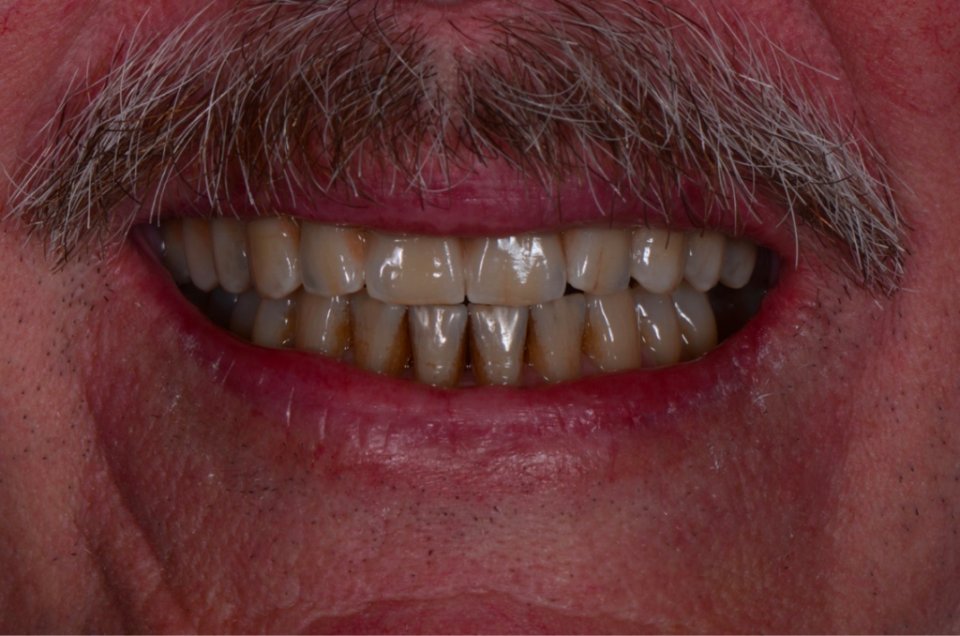
The very best way to decide which tooth bridge solution is right for you is to hold, feel and compare the bridges in person.
We invite you to book a complimentary consultation with our Patient Coordinator who can take you through every option, and answer your questions in a relaxed and caring environment.
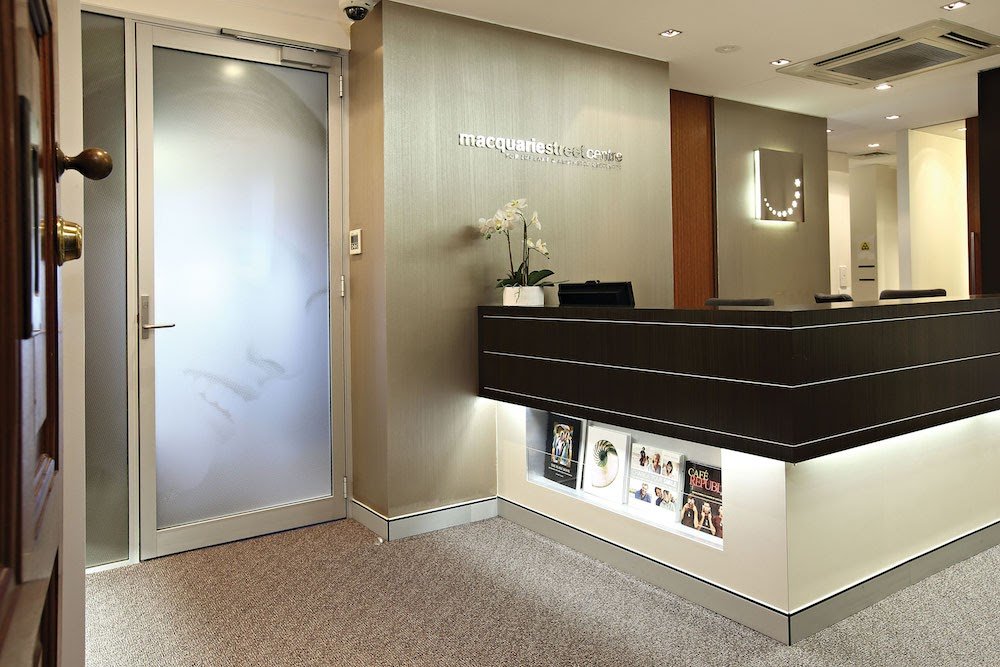
How long does a tooth bridge last?
The lifespan of your tooth bridge depends on a range of factors.
Some your dentist can control—for example, using only the best materials and a highly skilled prosthetist, bite management, and providing you with a custom All on Four protective nightguard.
Other factors are harder to control.
For example, you may have a strong bite and exert more force while chewing. You may have a natural predisposition to grinding (bruxism) which means you’ll exert more wear and tear on your tooth bridge. For patients with signs of bruxism, we recommend our Signature tooth bridge for added strength, and may also recommend regular muscle relaxant injections to control the strong jaw muscles.
The best way to combat all factors is to choose a well-trained dentist who will individually assess your needs and predicted outcomes before your All on Four treatment even begins.
As a rule of thumb if the bridge is made with acrylic material teeth (Our Classic bridge) you can expect it to last 3-5 years, however, many patients have worn theirs longer. Regular hygiene appointments will keep your bridge in tip-top shape and reduce natural staining from foods and drinks in addition to committing to wearing your night guard supplied at the end of treatment while you sleep.
The Signature bridge will yield the highest lifespan and exceptional value for money. Both the titanium and zirconia material are incredibly strong and barring an extreme accident are extremely difficult to break. As the material is not porous it will also not stain.
Tooth bridge material types at a glance
Acrylic
Used in dentistry for removable dentures and All on 4 fixed teeth. Acrylic is a strong plastic available in various tooth and gum shades. At Macquarie Street Centre our acrylic option is our Starter tooth bridge.
Titanium
Widely used in dentistry to make dental implants and reinforce tooth bridges. Titanium is an exceptionally strong corrosion and mechanical resistant metal, which makes it long-lasting and durable. It is highly biocompatible, with very high success rates. At Macquarie Street Centre, we use a titanium foundation in our Classic, Signature and Statement tooth bridges.
Zirconia
A strong ceramic used in dentistry to make tooth crowns and tooth bridges. Porcelain may be applied over zirconia to create a more natural tooth-like appearance. Considered to be highly aesthetic and strong. At Macquarie Street Centre, our zirconia option is the Signature tooth bridge.
Porcelain
Porcelain is used in dentistry to make crowns, veneers and tooth bridges. Porcelain is layered over a foundation (either metal or Zirconia) to closely mimic the look and feel of real tooth enamel. At Macquarie Street Centre, our porcelain option is the Statement tooth bridge.
Summary: Tooth materials costs can vary greatly. Further cost variations occur based on the time and quality of materials used to make your new teeth. Only highly customised All on 4 tooth bridge methods result in teeth that are strong, long-lasting and easy to clean.
All on Four Cost Variable 2: Training and Expertise of your Dentist
There’s an enormous amount of skill involved in dental implants to achieve natural-looking results that can also stand the test of time.
When it comes to choosing your All on 4 dentist, a proven track record in delivering service matters. Ask to see theirs.
Studies suggest that the number of years experience in performing full implant tooth replacement procedures is a key factor in the success rate of implants.
Done well, All on Four implants can have a success rate of up to 98%, making it one of the most successful dental treatments, but these studies are based on treatments performed by the most experienced dentists.
It’s simple: great dentists produce great results.
Your overall All on four cost is reflective of not only parts or materials, but your dentist’s experience and ability to manage all sorts of treatments, from the straightforward through to the most complex, with absolute confidence.
Remember—you’re effectively replacing the hardest working part of the mouth; it needs to withstand biting and chewing. Replacing an entire set of teeth requires a strong knowledge base to recreate the ‘bite’: how the teeth fit together against the opposing teeth.
A common complication of implants occurs when the ‘bite’ isn’t correctly adjusted, leading to pressure on the implants holding the teeth, sore jaws, headaches and even teeth popping off due to uncontrolled biting pressure. Make no mistake, a perfect bite takes years to master and is one of the most challenging aspects of providing fixed teeth on implants.
If the thought of a cut-price All on 4 in Thailand sounds enticing, read up on the major implications of having this procedure done off-shore before you make your choice.
Additionally, your All on four dentist should be dedicated to keeping up with advancements in dental implants, especially procedures to replace all missing teeth with fixed dental implants: the most complex and clinically challenging procedure of all.
Summary:
Senior professionals who have spent years perfecting their craft are likely to command higher All on 4 pricing.
Seven Questions for your All on 4 Provider
Choosing the right dentist is a critical decision in your journey. Asking the right questions will give you the information and confidence needed to help you make a fair assessment of your prospective dentist’s All on 4 pricing.




